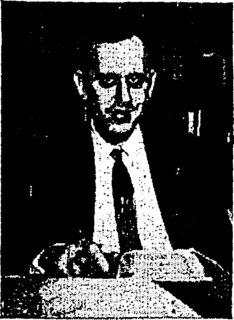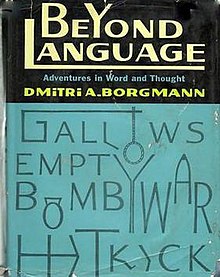A bigram or digram is a sequence of two adjacent elements from a string of tokens, which are typically letters, syllables, or words. A bigram is an n-gram for n=2. The frequency distribution of every bigram in a string is commonly used for simple statistical analysis of text in many applications, including in computational linguistics, cryptography, speech recognition, and so on.
Torpenhow Hill is claimed to be the name of a hill near the village of Torpenhow in Cumbria, England, a name that is a quadruple tautology. According to an analysis by linguist Darryl Francis and locals, there is no landform formally known as Torpenhow Hill there, either officially or locally, which would make the term an example of a ghost word.
A. Ross Eckler Jr. was an American logologist, statistician, and author, the son of statistician A. Ross Eckler. He served in the US Army from 1946 – 1947. He received a BA from Swarthmore College with High Honors in 1950 and a PhD in mathematics from Princeton University in 1954.
Darryl Francis is a well-known author of books on Scrabble.

Blennerhasset and Torpenhow is a civil parish in the Allerdale district of Cumbria, England. According to the 2001 census it had a population of 437, reducing to 423 at the 2011 Census. It includes the villages of Blennerhasset grid reference NY178415 and Torpenhow at NY202397 and the smaller settlement of Kirkland Guards at NY187401. It is located just outside the Lake District National Park. Baggrow railway station was immediately north of Blennerhasset.

Dmitri Alfred Borgmann was a German-American author best known for his work in recreational linguistics.
A ghost word is a word published in a dictionary or similarly authoritative reference work even though it had not previously had any meaning or been used intentionally. A ghost word generally originates from a typographical or linguistic error, taken as an unfamiliar word by readers.

Zzxjoanw is a fictitious entry in an encyclopedia which fooled logologists for many years. It referred to a purported Māori word meaning "drum", "fife", or "conclusion".

"Buffalo buffalo Buffalo buffalo buffalo buffalo Buffalo buffalo" is a grammatically correct sentence in English, often presented as an example of how homonyms and homophones can be used to create complicated linguistic constructs through lexical ambiguity. It has been discussed in literature in various forms since 1967, when it appeared in Dmitri Borgmann's Beyond Language: Adventures in Word and Thought.
A heterogram is a word, phrase, or sentence in which no letter of the alphabet occurs more than once. The terms isogram and nonpattern word have also been used to mean the same thing.
William Sunners (1904–1988) was an American write. He wrote over 100 books on how to win prizes in contests.
Logology is the field of recreational linguistics, an activity that encompasses a wide variety of word games and wordplay. The term is analogous to the term "recreational mathematics".

Word Ways: The Journal of Recreational Linguistics is a quarterly magazine on recreational linguistics, logology and word play. It was established by Dmitri Borgmann in 1968 at the behest of Martin Gardner. Howard Bergerson took over as editor-in-chief for 1969, but stepped down when Greenwood Periodicals dropped the publication. A. Ross Eckler Jr., a statistician at Bell Labs, became editor until 2006, when he was succeeded by Jeremiah Farrell.

Howard William Bergerson was an American writer and poet, noted for his mastery of palindromes and other forms of wordplay.
A panalphabetic window is a stretch of text that contains all the letters of the alphabet in order. It is a special type of pangram or pangrammatic window.
James Albert Lindon was an English puzzle enthusiast and poet specialising in light verse, constrained writing, and children's poetry.
A vocabularyclept poem is a poem which is formed by taking the words of an existing poem and rearranging them into a new work of literature.

Palindromes and Anagrams is a 1973 non-fiction book on wordplay by Howard W. Bergerson.

Language on Vacation: An Olio of Orthographical Oddities is a 1965 book written by Dmitri Borgmann.
The Puzzle Lovers Club was an American company which ran word game contests by mail.








